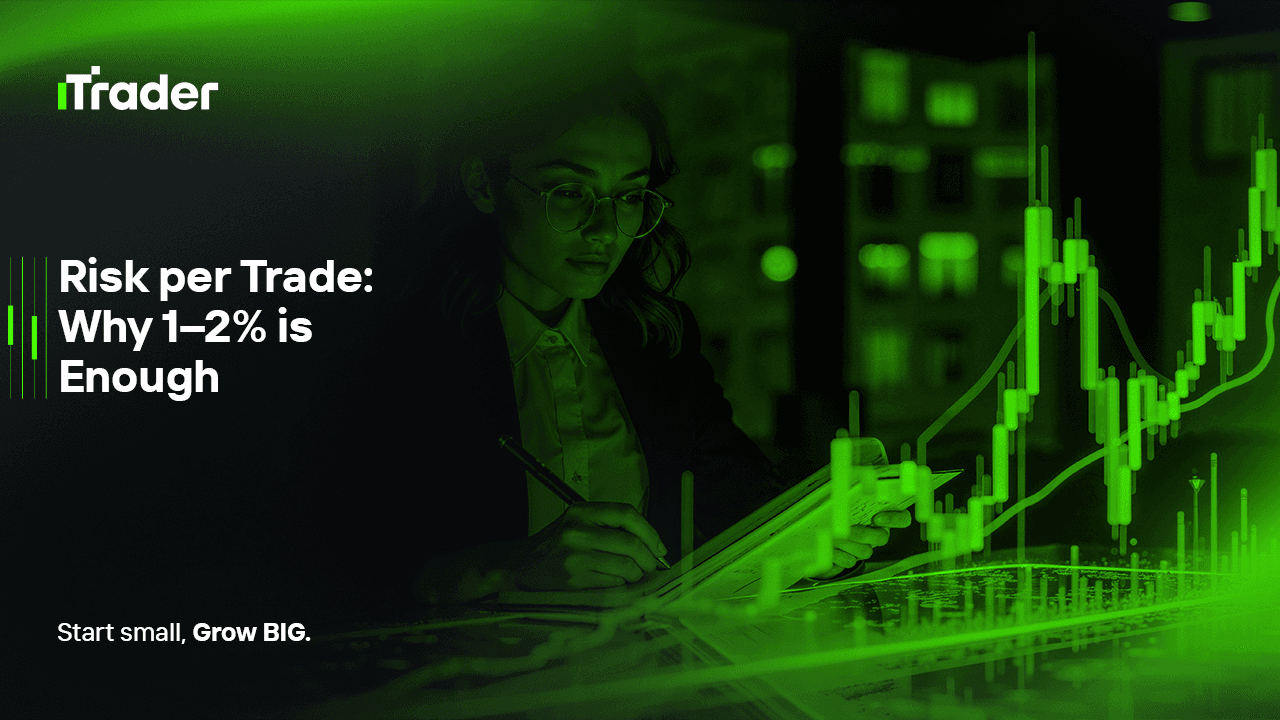2025-09-11
In forex trading, many traders focus on building profitable strategies, finding the best indicators, or identifying precise entry and exit points. Yet, the single most critical factor behind long-term success is risk management. The trader’s first goal is not to make money but to protect capital. This leads to the fundamental question: “How much of my account should I risk on a single trade?”

While there are many opinions, most professional traders and prop firm mentors agree on one golden rule: risking only 1–2% of your account per trade.
This blog will explain why that range has become the professional standard, backed by mathematics, psychology, and practical experience. We’ll also explore how this rule applies in the context of prop firm challenges, where strict drawdown rules demand disciplined risk control.
Risk per trade is the percentage of your trading account you are willing to lose if a trade goes against you.
For example:
This percentage determines not only your survival but also your ability to remain in a prop firm challenge, where strict daily and overall loss limits are enforced.
The 1–2% rule is based on statistical survival. It keeps losses small and recoverable.
As Warren Buffett famously said:
Preserving capital is the foundation of longevity in trading.
The probability of blowing an account (Risk of Ruin) grows exponentially when risk per trade increases. By keeping it within 1–2%, this probability becomes negligible, even through extended losing streaks.
Risking 5–10% per trade can quickly put an account into deep drawdown. Just a few losing trades may render recovery mathematically and psychologically impossible.
Large losses create fear and frustration, which disrupt discipline and often trigger impulsive decisions.
Traders who take oversized risks often try to “make it back quickly” with even larger positions. This is the fastest way to blow an account.
Prop firms like FTMO and MyForexFunds impose strict risk parameters:
If you risk 5% per trade, one bad trade could cause immediate failure. By keeping risk to 1–2%, you allow room for multiple trades and reduce the chance of disqualification.
Profitability is measured by expectancy:
Expectancy=(WinRate×AverageWin)–(LossRate×AverageLoss)Expectancy = (Win Rate × Average Win) – (Loss Rate × Average Loss)Expectancy=(WinRate×AverageWin)–(LossRate×AverageLoss)
With 1–2% risk, your losses remain small, and profitable trades can expand the account through favorable risk-to-reward ratios.
Keeping risk fixed at 1–2% allows for proper position sizing and consistent exposure, regardless of strategy or market volatility.
Let’s take a $100,000 prop firm challenge:
Clearly, the 1–2% approach provides far more breathing room.
The 1–2% rule is not just a guideline; it is a professional standard grounded in:
In trading, survival comes before profit. By keeping risk low, you buy yourself time for your edge to materialize. The 1–2% risk rule is the safest and most effective path to long-term consistency.
© 2025 iTrader Global Limited | หมายเลขทะเบียนบริษัท: 15962
iTrader Global Limited ตั้งอยู่ที่ Hamchako, Mutsamudu, เกาะปกครองตนเอง Anjouan, สหภาพคอโมโรส และได้รับใบอนุญาตและอยู่ภายใต้การกำกับดูแลของคณะกรรมการหลักทรัพย์แห่งคอโมโรส ภายใต้หมายเลขใบอนุญาต L15962/ITGL
iTrader Global Limited ดำเนินการภายใต้ชื่อทางการค้า “iTrader” และได้รับอนุญาตให้ดำเนินกิจกรรมการซื้อขายฟอเร็กซ์ โลโก้ เครื่องหมายการค้า และเว็บไซต์ของบริษัทเป็นทรัพย์สินเฉพาะของ iTrader Global Limited
บริษัทย่อยอื่น ๆ ของ iTrader Global Limited ได้แก่ iTrader Global Pty Ltd หมายเลขทะเบียนบริษัทออสเตรเลีย (ACN): 686 857 198 โดยบริษัทนี้เป็นตัวแทนที่ได้รับอนุญาต (หมายเลขตัวแทนบริการทางการเงินของออสเตรเลีย (AFS): 001315037) ของ Opheleo Holdings Pty Ltd (ใบอนุญาตบริการทางการเงินของออสเตรเลีย (AFSL): 000224485) ซึ่งมีที่อยู่จดทะเบียนอยู่ที่ Level 1, 256 Rundle St, Adelaide, SA 5000 ข้อจำกัดความรับผิดชอบ: นิติบุคคลนี้ไม่ใช่ผู้ออก และไม่รับผิดชอบต่อผลิตภัณฑ์ทางการเงินที่ซื้อขายบนหรือผ่านเว็บไซต์นี้
คำเตือนความเสี่ยง: การซื้อขาย CFD มีความเสี่ยงสูงต่อการสูญเสียเงินทุนอย่างรวดเร็วเนื่องจากเลเวอเรจ และอาจไม่เหมาะสมกับผู้ใช้ทุกคน
การซื้อขายกองทุน CFD และผลิตภัณฑ์ที่มีเลเวอเรจสูงอื่น ๆ ต้องการความรู้เฉพาะทาง
จากผลการวิจัยพบว่า 84.01% ของผู้เทรดที่ใช้เลเวอเรจประสบกับการขาดทุน
โปรดตรวจสอบให้แน่ใจว่าคุณเข้าใจความเสี่ยงทั้งหมด และพร้อมที่จะสูญเสียเงินทุนก่อนที่คุณจะเข้าร่วมการซื้อขายที่มีเลเวอเรจ
iTrader ขอประกาศว่า บริษัทจะไม่รับผิดชอบต่อความเสี่ยง ความเสียหาย หรือการสูญเสียใด ๆ ที่เกิดขึ้นจากการซื้อขายแบบมีเลเวอเรจต่อบุคคลหรือนิติบุคคลใด ๆ ทั้งสิ้น
ข่าวสารและข้อมูลที่ปรากฏบนเว็บไซต์นี้มีไว้เพื่อวัตถุประสงค์ทางการศึกษาเท่านั้น ผู้ใช้ควรตัดสินใจทางการเงินอย่างอิสระและโดยใช้ข้อมูลอย่างรอบคอบ
ข้อจำกัด: iTrader ไม่ได้มุ่งเป้าเว็บไซต์หรือบริการไปยังผู้อยู่อาศัยในประเทศที่กฎหมายหรือข้อบังคับห้ามไม่ให้มีการทำธุรกรรมดังกล่าว
หากคุณอาศัยอยู่ในเขตอำนาจที่การใช้เว็บไซต์หรือบริการนี้ถูกจำกัด คุณต้องรับผิดชอบในการปฏิบัติตามกฎหมายท้องถิ่น
iTrader ไม่รับประกันว่าเนื้อหาบนเว็บไซต์ของบริษัทจะเหมาะสมหรือถูกต้องตามกฎหมายในทุกพื้นที่